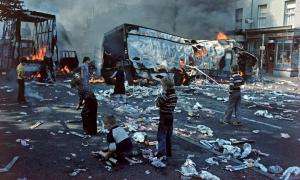Social work in The Troubles report a timely lesson from history, says BASW chief exec

Professional Social Work magazine - 8 February 2019
A report capturing the experiences of social workers practising amid the civil unrest of The Troubles could not be more timely, said the chief executive of the British Association of Social Workers.
The study, called The Voice of Social Work Through The Troubles, was hailed as a groundbreaking insight into the professional lives of those working in a conflict zone at its launch in Belfast yesterday.
Speaking at the event, Dr Ruth Allen said: “The decision to undertake this work and tell these stories could hardly be more prescient. We are living in a time of new uncertainties across the island of Ireland and across the UK and Europe.
“On top of the power sharing here we have disorderly politics and the still unknown shape of Brexit is looming. It is very serious.
“This research tells us we cannot assume the worst can’t happen and we are beyond civil conflict. It shows us how precious is hard won peace.”
The study contains accounts by social workers attempting to support people against a backdrop of sectarian violence, bombings, paramilitary violence, threats and intimidation.
One of the contributors recalled his office been hit by a rocket. Another talked about sitting with a client who had a gun beside him. More than six out of ten said they felt at risk doing their job during The Troubles between 1969-1998.
Dr Allen said she hoped the study, funded by BASW Northern Ireland and the Northern Ireland Social Care Council, would influence how social work leaders in the UK and across the world supported practitioners in “traumatising situations”.
She added the report was also a tribute to the spirit of social workers.
“Professionally it also shows us how resilient, reflective and committed social workers can be. How we can hold onto our ethics and focus on building relationships even under great duress and help people change even in the most divided situations.
“In the midst of mess and ethical challenges, social workers coped. They got on with it and crucially they supported each other. We are strongest when we act and reflect together.”
The report highlights a lack of support for those practising in The Troubles with social workers typically left to rely on each other or just bury their trauma.
Dr Joe Duffy of Queen’s University Belfast, who led the study with Dr Jim Campbell of University College Dublin and Dr Carol Tosone of New York University, paid tribute to the workers.
“Social workers experienced road blocks, bomb scares, direct intimidation, sectarianism, personal threats. You go out to fulfil these important protective functions and that’s what you encounter and yet you still do it and get on with the job.
“You don’t take leave because you know people need your help. You talk to your colleagues but not about the elephant in the room. There is a conceptual ambiguity. You are dealing with paramilitaries, people who are wedded to violence.”
A leading figure within the international social work community apologised to Northern Ireland’s social workers and others working in conflict zones for failing to support them in the past.
Rory Truell, secretary general of the International Federation of Social Workers, said: “There is not one policy for the profession at the global level that has recognised the challenges of your work.
“This is not acceptable. We know in your roles you put yourselves at risk to support vulnerable people, to support children, to support your colleagues to support your profession and we want to acknowledge we were not there to support you. We apologise.”
Truell said the Northern Ireland report was “opening our eyes”.
He added: “It is going to change what happens at the international policy level. It is going to change the information social workers are taught in social work schools and the narrative of understanding. “It is not going to let what happened to you happen to other people in war and conflict situations.”
